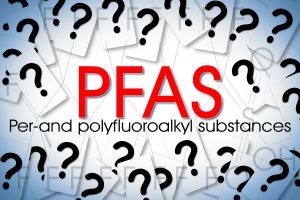
The EU is committed to phasing out all per- and polyfluoroalkyl substances (PFAS). However, if it can be proven that PFAS cannot be replaced in certain products and their use is essential for society, exemptions are possible. To help you understand how the PFAS restriction will affect the display industry, we have compiled some information for you here.
PFAS Restriction: Key topic of discussion for the DFF and its members
The DFF (Global Network for Display Professionals) recommends to carefully check the use of PFAS in order to be able to act on exemptions in time. Per- and polyfluoroalkyl substances are a large family of synthetic chemicals. They are used in many areas, among other things because of their heat-stable and water- and grease-repellent properties.
In particular, they are used in aerospace, defense, automotive, textile (leather and apparel), construction, household, electronics, firefighting, food processing and medical products.
They are also used in display technology: for example, liquid crystal mixtures for IPS and FFS displays contain PFAS to ensure proper functioning.
The planned restrictions have been an issue for the DFF since 2022. We have already discussed them with our display experts in two of our regular meetings. Among our members there are also several experts who have been intensively dealing with the topic of PFAS for a few years. Therefore, it is a special concern for us as a global technology association to inform the display industry worldwide about the topic.
It is our goal to also exchange views on the coming restrictions with external experts and to find the best solutions for our members and the display industry as a whole.
DFF Expert Talk: What is the current status of the PFAS restriction proposal?
Dr. Michael Schlipf, CEO FPS GmbH:
 “Regulators of the countries Germany, the Netherlands, Denmark, Norway and Sweden have initiated an overall restriction proposal for all PFAS substances. This proposal is coordinated by ECHA, the European Chemical Agency, and it is handled under REACH (European Chemicals Regulation: Registration, Evaluation, Authorisation and Restriction of Chemicals). According to ECHA’s definition, PFAS are substances containing specific Fluorine-containing segments. Thus, more than 10,000 substances are affected by this approach. However, EU’s benchmark for REACH substance restriction has to be risk-based.
“Regulators of the countries Germany, the Netherlands, Denmark, Norway and Sweden have initiated an overall restriction proposal for all PFAS substances. This proposal is coordinated by ECHA, the European Chemical Agency, and it is handled under REACH (European Chemicals Regulation: Registration, Evaluation, Authorisation and Restriction of Chemicals). According to ECHA’s definition, PFAS are substances containing specific Fluorine-containing segments. Thus, more than 10,000 substances are affected by this approach. However, EU’s benchmark for REACH substance restriction has to be risk-based.
The Federal Government of Germany believes that blanket, undifferentiated bans on entire classes of substances are not covered by the existing European regulatory framework. Consequently, more than 5,000 submissions, mainly from industry in Europe, were generated and sent to ECHA during the “Public Consultation on the Restriction Proposal” in 2023. Two teams within ECHA, RAC and SEAC, are now evaluating the scientific and socio-economic aspects of these documents.
Target is to come back with a revised draft of the restriction proposal by considering all concerns, and to return to a risk-based approach considering the special properties of the individual substances. A total ban on PFAS is not planned and would not be supported by the Federal Government.
The aim is to find the best compromise between the avoidance of the negative effects of substances on the environment and health and increasing dependencies on non-European suppliers and, on the other side, to further improve the industry’s ability to transform, research into new technologies if required with less or no PFAS, and thus to preserve EU’s industry competitiveness in order to develop the EU‘s future in prosperity.”
Martin Saeckl, Manager Public Affairs Daikin Chemical Europe GmbH:
 “The Risk Assessment and Socio-Economic Assessment Committee evaluate skiwax, cosmetics and consumer mixtures. These segments will be discussed on 14 March where also a workplan for 2024 is expected to be published.
“The Risk Assessment and Socio-Economic Assessment Committee evaluate skiwax, cosmetics and consumer mixtures. These segments will be discussed on 14 March where also a workplan for 2024 is expected to be published.
The current status is that ECHA (European Chemical Agency) will follow a sector-by-sector approach. Based on the high number of submissions and applications for different industry sectors it is therefore challenging to keep the timeline.”
Official EU information on the PFAS Restriction can be found at ECHA (European Chemicals Agency):
- https://echa.europa.eu/de/hot-topics/perfluoroalkyl-chemicals-pfas
- https://echa.europa.eu/en/registry-of-restriction-intentions/-/dislist/details/0b0236e18663449b
Further information on the PFAS Restriction
Please find here a collection of useful information on the PFAS topic. We update the link list regularly to keep you up to date.
DFF Press Coverage (in German)
- Elektronikpraxis, “Gefährliche Stoffe: EU will PFAS bei IPS- und FFS-Displays verbieten“, 21.02.2022
- Elektronik.net, “EU will ein allgemeines PFAS-Verbot. Wo die Display-Industrie betroffen ist.“, 07.03.2022
German Sources of Information
- Allgemeine Information des VDMA e. V. (Verband Deutscher Maschinen-u. Anlagenbau)
- Positionspapier des VDMA und weiterer Unternehmen zum PFAS-Verbot
- pro-K Industrieverband, “PFAS-Regulierungsvorschlag ohne Differenzierung für Fluorkunststoffe“
- pro-K Industrieverband
- Informationsseite des Bundesamtes für Risikobewertung
- Elektroniknet, 05.10.2023: Spectaris und VDMA mahnen erneut »Das PFAS-Verbot gefährdet europäische Hightech-Anwendungen«
- Industry Forward, 04.10.2023: Regulierung durch die EU: Gefährdet das PFAS-Verbot europäische Hightech-Anwendungen?
- Welt, 04.08.2023: Habeck warnt vor Überregulierung bei Chemikalien
- tagesschau, 23.02.2023: Jahrhundertgift: PFAS an mehr als 1500 Orten in Deutschland nachgewiesen
- VDMA e. V., 24.05.2023, Industrie Podcast, Ep. 42: Ohne PFAS keine Energiewende
- VDMA e. V., 04.05.2023, Sarah Brückner: “PFAS-Regulierung oder Energiewende” | VDMA
- INDUSTR.COM, 22.01.2024, VDMA-Hauptgeschäftsführer Thilo Brodtmann: “PFAS: ‘Politik geht endlich auf berechtigte Warnungen ein'”
Further Sources of Information
- EPA (United States Environmental Protection Agency)
- PFAS-Tox Database
- OECD/UNEP Global Perfluorinated Chemicals (PFC) Group
- PFAS Central
- The Agilent PFAS MRM Database for Triple Quadrupole LC/MS
- Science Direct
- Nature
- KEMI, Swedish Chemicals Agency
- NIST (National Institute of Standars and Technology, USA)
 Any questions on the topic?
Any questions on the topic?
Please get in touch with Hartmut Heske, General Manager DFF.